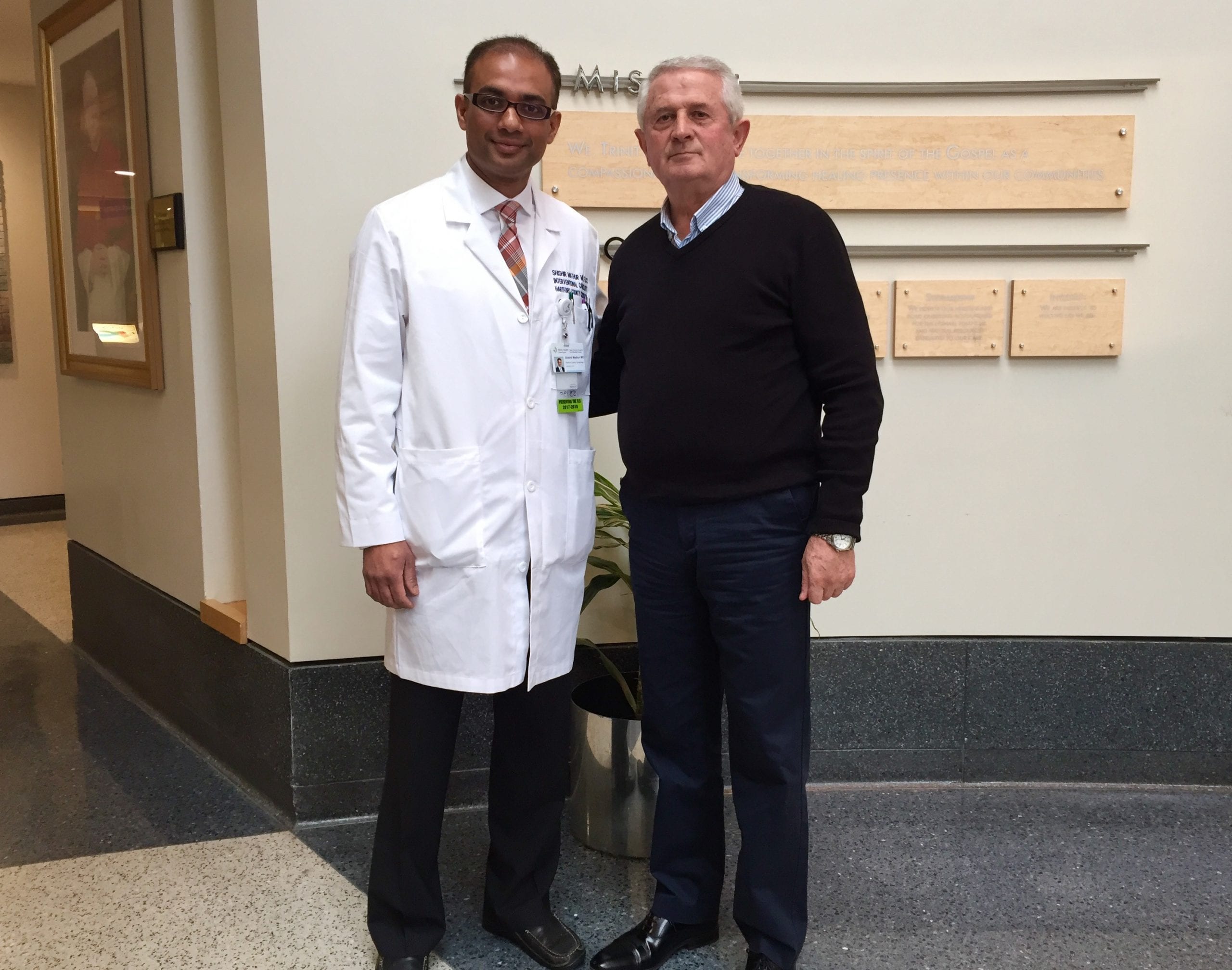West Hartford Cardiologist Saves Life of High-Ranking European Politician

Audio By Carbonatix

Dr. Shishir Mathur (left) and Sen. Husnija Sabovic at St. Francis Hospital. Photo credit: Ronni Newton
A member of Montenegro’s Parliament was visiting Connecticut at the tail end of a diplomatic mission to the United States, when required emergency treatment at St. Francis Hospital.
By Ronni Newton
Senator Husnija Sabovic, a member of the 82-person Parliament in the Southeastern European country of Montenegro, was visiting family in Connecticut after a series of political and diplomatic meetings in Washington, DC, when his plans – and likely his life – changed dramatically following a visit to the St. Francis Hospital Emergency Room.
Sabovic’s visit to St. Francis resulted in a life-saving procedure performed by West Hartford resident and interventional cardiologist Dr. Shishir Mathur.
Sabovic, 65, speaking through his sister-in-law as a translator, told We-Ha.com that he had been experiencing chest pains for about six months in his home country of Montenegro. He had sought medical attention, but received a vague diagnosis of calcifications following a CT scan, and no advice regarding further treatment.
On Jan. 16, Sabovic was in Connecticut for a brief visit with his brother and sister-in-law before returning home.
“The day before he had been having more chest pains. They lasted all night and he was not able to sleep,” Mathur said.
When Sabovic arrived at the St. Francis Hospital Emergency Room the morning of Jan. 16, and described his symptoms, Mathur, a board-certified cardiologist, was brought in to do an evaluation.
“I thought right away he had some type of coronary heart disease,” Mathur said, and he began an emergency cardiac catheterization procedure within minutes.
Mathur, 41, a graduate of the University of Connecticut School of Medicine who did his residency and fellowship at Hartford Hospital, is one of a handful of interventional cardiologists on staff who is trained to conduct the procedure through the wrist, rather than through the groin.
The procedure involves insertion of a catheter into the coronary artery. Dye is injected and pictures are taken.
“I found two of three major arteries of his heart had critical blockages of 90-95 percent,” Mathur said. “No wonder he was having chest pains.”
The official term for the condition is “unstable angina,” Mathur said. “It was an impending heart attack.”
The same access site is used to insert a balloon as well as stents, Mathur said. In Sabovic’s case, he inserted three stents.
According to Mathur, the entire procedure took about two hours, and Sabovic was up and about two hours later. He was discharged the next day.
“I’m pleased to have been your patient,” Sabovic told Mathur, praising his professional care.
Sabovic said he felt better immediately, other than a little bit of “pinching.” Mathur said that’s inflammation from the stents, and wears off within a few weeks at the most.
The only visible effect of the procedure is a scar the “size of a shirt button” on the wrist, but that also fades away in a few weeks, Mathur said.
Mathur said that Sabovic, who was set to return to Montenegro on Thursday, will definitely need continuing care, and will need to find a cardiologist. Mathur provided him with all of his medical records, his email address, and offered to stay involved in his care. According to Sabovic, he went above and beyond what was expected.
“Dr. Mathur offered himself to talk to my cardiologist. That makes me feel very confident and appreciative,” Sabovic said.
“I’m very thankful to the U.S. and the plan of care offered,” Sabovic said. He said that the system in his country is a hybrid of private and national healthcare, and is still a “work in progress” in the Balkun country which was formerly part of Yugoslavia. Montenegro has been an independent nation for just over a decade and has a friendly relationship with the U.S., Sabovic said.
Healthcare in the United States is often the subject of criticism, but Sabovic had nothing but praise for the professional and humane treatment he received. He said he would like to use his experience to bring positive changes to healthcare in his own country.
Sabovic said he was happy to be interviewed and share his life-saving experience. “Excellent!” was how he described the way he was feeling.
Sabovic is married and has five children – three girls and two boys – and three grandchildren. “I want to invite you as a guest in my home, with my family,” he told Mathur. “Montenegro is a beautiful country.”
Mathur said that Sabovic, who lives a healthy and active life, was not at high risk yet he developed serious coronary artery disease. Risk factors include smoking and diabetes, “yet patients without apparent risk factors can also develop coronary artery disease due to complex genetics and the aging process,” Mathur said.
“Timely medical attention and treatment can be lifesaving in these situations,” Mathur said. “Although coronary artery disease usually presents with chest pain, some patients, especially women, can have atypical symptoms like heartburn, a choking sensation, or shortness of breath. As complex as heart disease is, prevention of heart disease is really about small choices we make everyday in our lives,” he said.
“Never picking up that first cigarette, or adding a fruit and vegetable to your daily meals, or taking 30 minutes out of your schedule to walk or run are things we all know but some of us fail to practice,” said Mathur. “In the era of rising healthcare costs, I cannot hope for anything more than everybody taking control of their health by making these right choices.”
Mathur graduated from college in India, and moved to West Hartford in 2009 when he was doing his cardiology training at Hartford Hospital.
He left the area for a few years to practice cardiology in North Carolina and then Pittsburgh, but he and his wife, Devi, and their three boys (Aarav, 10, Aashir, 7, and Aavien, 1) returned to West Hartford last summer.
“We missed west Hartford, and Aarav and Aashir missed Aiken and their friends, so we moved back in August 2017, and I started working with my current practice, Hartford County Cardiology, here in November 2017,” Mathur said.
Like what you see here? Click here to subscribe to We-Ha’s newsletter so you’ll always be in the know about what’s happening in West Hartford!



